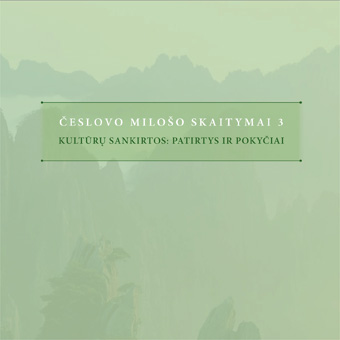Teodoras Celmas – Latvijos filosofijos maestro
Theodore Celms – Maestro of Latvian Philosophy
Author(s): Diana ČesnauskaitėSubject(s): Literary Texts
Published by: Vytauto Didžiojo Universitetas
Keywords: Kant; Dostoevsky; the law of the morality; religion; suffering; beatitude; Kantas; Dostojevskis; moralės dėsnis; religija; kančia; palaima
Summary/Abstract: Theodore Celms (1893-1989) is one of the most famous personalities in the history of Latvian philosophy. It is difficult to frame his activities: public lectures and various published articles are based on difference subjects. His main monograph („Der phänomenologische Idealismus Husserls“, 1928), written in German, reveals his critical approach to Husserls’ phenomenology, that’s why it’s conventional to call him phenomenologist. T. Celms continue his phenomenological researches in the articles, written in USA. Articles in Latvian were meant for the common readers (so called texts of „popular philosophy“). These articles are published in his selections „Patiesība un šķitums“(„Reality and Appearance“, 1939) and „Tagadnes problēmas“(„Modern questions“, 1933). The article „Dostoevsky and Kant“ is one of the few in which Celms talks about religion. He was interested in the topics of philosophy of religion, but did not think that the issues raised by this philosophy were purely philosophical. The article is written on the basis of speech delivered by Celms on the occasion of Dostoevsky’s 50th death anniversary, organized by the Kant Society (all the teachers of philosophy at Latvian University were the members of the Society). Latvian philosopher appeals to the novel of Dostoevsky „The Brothers Karamazov“ and to the works of Kant („Critique of Practical Reason“, „Religion within the Limits of Reason Alone“, „Groundwork of the Metaphysics of Morals“). Celms recognises that Kant and Dostoevsky were very different thinkers and looks for the relations of the philosophy of the morals and the philosophy of religion. Namely in these fields were found the most similarities in the approaches of Kant and Dostoevsky. The unifying thesis is: the theoretical mind is unable to deal with a problem of the existence of God and immortality of the soul.
Journal: Česlovo Milošo skaitymai
- Issue Year: 2010
- Issue No: 3
- Page Range: 117-136
- Page Count: 20
- Language: Lithuanian

